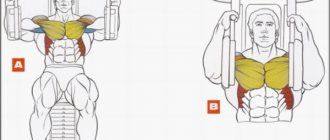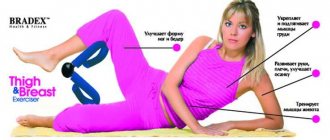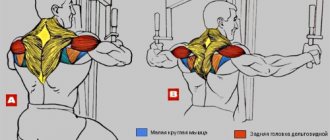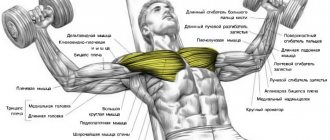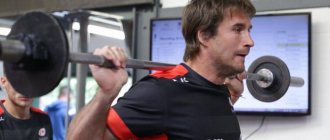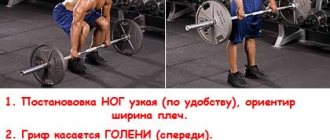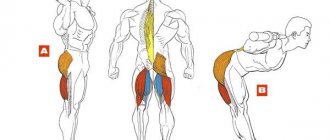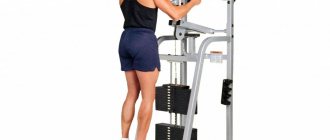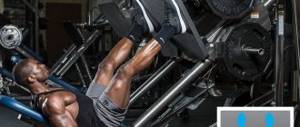So let's get started!
Why is the military press so important?
If you were asked to choose just one exercise to develop your shoulder muscles for the rest of your life, it would be prudent to choose only the military press.
Why?
First of all, this is a basic exercise. That is, unlike isolating ones, it includes several joints and muscle groups at once. Maximum load on the shoulders is achieved and, at the same time, many other muscles are worked.
What muscles are involved?
- Deltoid. Our shoulder (or deltoid) muscles are divided into 3 bundles: anterior, middle (lateral), posterior. With the correct technique, all three of these muscles work in the military press.
- Trapezoidal. Many believe that huge traps can best be built with shrugs and barbell rows to the chin, but this is not entirely true. During the military press, the trapezius muscles are forced to hold significantly more weight than in any isolation exercise.
- Triceps. All pressing exercises require the involvement of the triceps brachii muscle. The triceps are mainly involved in the process in the second phase of the movement from the moment when the barbell is already above the head until the elbows are fully straightened.
- Core muscles (deep muscles that stabilize the spine). Naturally, we are talking about the military standing press. But even when you sit, the core is involved in the process much more than it seems. In addition, exercises to strengthen the core muscles are very useful for training the abs. And in this sense, the military press is one of the best in the company of squats and deadlifts.
Standards[edit | edit code]
Standards of the Russian Powerlifters Union[edit | edit code]
Standing press without undergoing doping control
| Men | |||||||
| Weight category | Elite | MSMK | MS | KMS | I | II | III |
| 52 | 85 | 77,5 | 67,5 | 55 | 47,5 | 42,5 | 35 |
| 56 | 92.5 | 85 | 70 | 62,5 | 57,5 | 47,5 | 42,5 |
| 60 | 100 | 90 | 80 | 67,5 | 62,5 | 55 | 50 |
| 67,5 | 107,5 | 100 | 87,5 | 75 | 67,5 | 62,5 | 55 |
| 75 | 115 | 110 | 95 | 80 | 72,5 | 67,5 | 60 |
| 82,5 | 122,5 | 115 | 102,5 | 85 | 77,5 | 70 | 62,5 |
| 90 | 135 | 125 | 110 | 92,5 | 80 | 75 | 67,5 |
| 100 | 157,5 | 140 | 122,5 | 105 | 87,5 | 82,5 | 75 |
| 110 | 165 | 152,5 | 130 | 112,5 | 100 | 92,5 | 82,5 |
| 125 | 177,5 | 162,5 | 140 | 120 | 112,5 | 100 | 92,5 |
| 140 | 187,5 | 170 | 152,5 | 135 | 122,5 | 107,5 | 100 |
| 140+ | 195 | 177,5 | 160 | 142,5 | 135 | 122,5 | 105 |
| Women | |||||||
| Weight category | Elite | MSMK | MS | KMS | I | II | III |
| 52 | 65 | 57.5 | 52.5 | 40 | 35 | 32.5 | 27.5 |
| 60 | 72.5 | 65 | 60 | 47.5 | 40 | 35 | 32.5 |
| 67.5 | 77.5 | 72.5 | 65 | 57.5 | 45 | 40 | 37.5 |
| 75 | 95 | 77.5 | 72.5 | 62.5 | 52.5 | 47.5 | 45 |
| 75+ | 107.5 | 95 | 77.5 | 67.5 | 62.5 | 57.5 | 52.5 |
Standing press with doping control
| Men | |||||||
| Weight category | Elite | MSMK | MS | KMS | I | II | III |
| 52 | 75 | 67,5 | 55 | 45 | 40 | 30 | 27,5 |
| 56 | 82,5 | 75 | 60 | 52,5 | 45 | 40 | 30 |
| 60 | 92,5 | 80 | 70 | 57,5 | 52,5 | 45 | 37,5 |
| 67,5 | 100 | 87,5 | 75 | 65 | 57,5 | 52,5 | 45 |
| 75 | 107,5 | 95 | 82,5 | 72,5 | 65 | 57,5 | 50 |
| 82,5 | 115 | 102,5 | 92,5 | 77,5 | 67,5 | 60 | 55 |
| 90 | 127,5 | 117,5 | 102,5 | 85 | 72,5 | 65 | 57,5 |
| 100 | 150 | 130 | 115 | 97,5 | 80 | 75 | 65 |
| 110 | 155 | 142,5 | 122,5 | 105 | 92,5 | 82,5 | 75 |
| 125 | 165 | 152,5 | 132,5 | 112,5 | 102,5 | 92,5 | 82,5 |
| 140 | 175 | 162,5 | 142,5 | 125 | 112,5 | 100 | 90 |
| 140+ | 185 | 167,5 | 150 | 132,5 | 125 | 110 | 97,5 |
| Women | |||||||
| Weight category | Elite | MSMK | MS | KMS | I | II | III |
| 52 | 52,5 | 47,5 | 40 | 35 | 30 | 25 | 22,5 |
| 60 | 60 | 55 | 47,5 | 37,5 | 32,5 | 27,5 | 25 |
| 67.5 | 65 | 60 | 55 | 47,5 | 37,5 | 35 | 30 |
| 75 | 82,5 | 67,5 | 60 | 50 | 47,5 | 42,5 | 37,5 |
| 75+ | 95 | 80 | 67,5 | 60 | 52,5 | 47,5 | 45 |
Execution technique
Many athletes avoid the military press because they feel the excessive stress on their joints. If done correctly, however, this problem does not arise. As with any basic exercise, it all depends on technique. Here's how to do it correctly
Let's divide the movement into several steps:
- Place your feet shoulder-width apart.
- Grip the barbell slightly wider than shoulder-width apart.
- At the beginning of the movement, the bar should be at chin level.
- Raise the barbell vertically until your elbows are completely straight.
- Slowly lower the bar back to chin level.
Important Details
- Take a deep breath before lifting the apparatus - this helps stabilize the chest and shoulder blades. Exhale when the bar is at the top point.
- Try to keep your forearms upright throughout the set to maintain balance and to ensure that the stress is placed on your elbows rather than your wrists.
- At the top point, your elbows should be in line with your ears (neither in front nor behind) - point the barbell up the shortest distance. Do not lower the barbell below your chin at the bottom point - this will reduce the load on the deltoid muscles.
- Actively tense your gluteal, quadriceps, back, and abdominal muscles during each repetition. This creates a rigid base, which means more force can move up to the arms.
Common mistakes
- Neglecting warm-up. To avoid injury, it is important to do both general and 1-2 approaches with light (warm-up) weight.
- Bouncing the barbell from the chest. The bar is pushed upward by pushing with the legs. The main problem is that a lot of the load is transferred from the arms to the legs. You can slightly bend your knees during the exercise, but if you press not from the shoulder girdle, but from jumping, then this is just a waste of time.
- Excessive stress on joints. Shoulder injuries occur when trying to lift a barbell for which your joints are simply not ready yet, which you simply cannot handle (or when lifting to the point of muscle failure). You need to start with light weights and proper technique. Then gradually increase the load.
- Lots of repetitions with light weight. For some unknown reason, many athletes tend to do high rep sets with light weights. It is not good! Just like any other muscle group, the shoulders need a progressive load. In order for a muscle group to grow and increase in size, you need to constantly weigh down the lifting projectile. When it comes to shoulder training, heavier weights with fewer reps will put less stress on your joints.
It is optimal to do 6-8 repetitions with 80-90% of the one-rep maximum. 3-4 approaches.
Typical beginner mistakes
Along with the bench press, deadlift and squats with a barbell on the shoulders, the military press is an exercise that can not only contribute to the all-round development of the athlete, but also cause irreparable harm to health, and recovery from the injury can take more than one month. Therefore, if you recognize yourself in one of the points described below, you should reconsider your military press technique, starting from the very basics, and even better, do not repeat your mistakes and seek help from an experienced, highly qualified instructor.
Neglecting warm-up
Before performing a classic standing barbell press, due attention should be paid to joint warm-up; shoulders, hands and elbows should be thoroughly warmed up and prepared for work. If your working weight in the military press is high enough, take the time to perform several warm-up approaches, starting with an empty bar and gradually increasing the weight of the apparatus. It is also recommended to stretch the triceps separately, since it receives a decent load in this exercise; several sets of extensions from the upper block with light weight will only be beneficial.
Too much weight
The standing barbell press is an excellent accessory exercise for the bench press, but even it is not recommended to work in a very low repetition range and with a huge weight. If you lift a weight that is too heavy, you lose almost all the benefits of doing this exercise, since you do not have time to put enough stress on the deltoids (shoulders do not like work in low rep ranges; our deltoids and shoulder joints are simply not designed for strength work). You also overload the rotator cuff and ligaments of the shoulders, elbows and hands, which can lead to injury.
In such traumatic exercises, you should never deviate from the correct technique in favor of heavier weights or more repetitions. By including additional muscle groups (legs, lower back), you not only reduce the effectiveness of the standing barbell press, since the shoulders receive less load, but you also risk serious spinal injury due to severe compression of the intervertebral discs in the lumbar region.
Fixation at the top point
You should not fixate at the top point for more than a few seconds - this will increase the axial load on the spine significantly, as in squats with a barbell overhead.
Incorrect position of the bar
The projectile should be located on the chest or in close proximity to it and the collarbones. If the barbell is brought forward too much, the shoulder joint moves a little forward, and the position of the elbow is also unstable. Doing a military press in this position, I give a 99% guarantee that you will get injured.
Choose the right shoes
Take this point seriously, remember that your legs are your foundation, and the entire result depends on how strong and stable it is. If you find it difficult to maintain balance during the approach, try changing your training shoes; it is best to use sneakers with a rigid sole without a heel or instep.
Don't experiment with overhead presses
If you have mastered the correct technique of the military press and have developed a good neuromuscular connection in it, leave this shoulder exercise as the main one in your arsenal, do not try to replace it with the barbell overhead press. The load in these two exercises is almost the same, the main part of it falls on the anterior delta, but when pressing from behind the head, the shoulder joint is fixed in an unnatural position, due to which it is often subject to injury.
Video from Alexey Nemtsov about common mistakes beginners make when performing standing barbell presses:
Exercise options
Sitting
Which option is better - sitting or standing?
Expert opinions, as always, are divided. When performed while seated, you can generally lift more weight and place less stress on your legs and torso (core). But to connect more muscle groups and gain muscle mass, you need to do a standing military press. Undoubtedly! If you decide to load mainly only your shoulders, then the sitting option is ideal. And the best thing is a combination of both (alternate).
With dumbbells
Isn't it better to do it with dumbbells?
The question is not simple. There are undeniable advantages and disadvantages of the dumbbell option. In this case, more muscle fibers are definitely activated and the range of movements is much greater. The biggest disadvantage is that the weight on the barbell will always be significantly greater than the weight of the dumbbells. This means that there will be greater gains in strength and muscle mass.
Advice: you need to do both options. One week do the military press with dumbbells, the other week with a barbell.
In the Smith machine
Everything is much simpler here.
It is much more effective to train with free weights. It is a fact!
The only time to use a Smith machine is during a warm-up, when there are too many people in the gym and you need to warm up quickly. It's not that it's impossible to get a good workout in the Smith machine, it's just that the workout will be much more effective with free weights.
Training programs
The military press is added to the beginning of shoulder training. As a rule, they are trained either on a separate day or with legs.
The most popular split programs:
| Shoulders on a separate day | |
| Exercise | Sets x reps |
| Standing barbell press | 4х15,12,10,8 |
| Seated dumbbell press | 4x12 |
| Wide grip pull | 4x12 |
| Dumbbell swings while standing to the sides | 3x15 |
| Bent over dumbbell swings | 4x15 |
| Arm raises in the rear deltoid machine | 4x15 |
| Legs+shoulders | |
| Exercise | Sets x reps |
| Squats | 4х12,10,8,6 |
| Leg press in the simulator | 3x12 |
| Bending in a lying machine | 4x15 |
| Bend one leg while standing in the simulator | 4x12 |
| Standing barbell press | 4х15,12,10,8 |
| Wide grip pull | 4x15 |
| Side bend swings | 4x15 |
